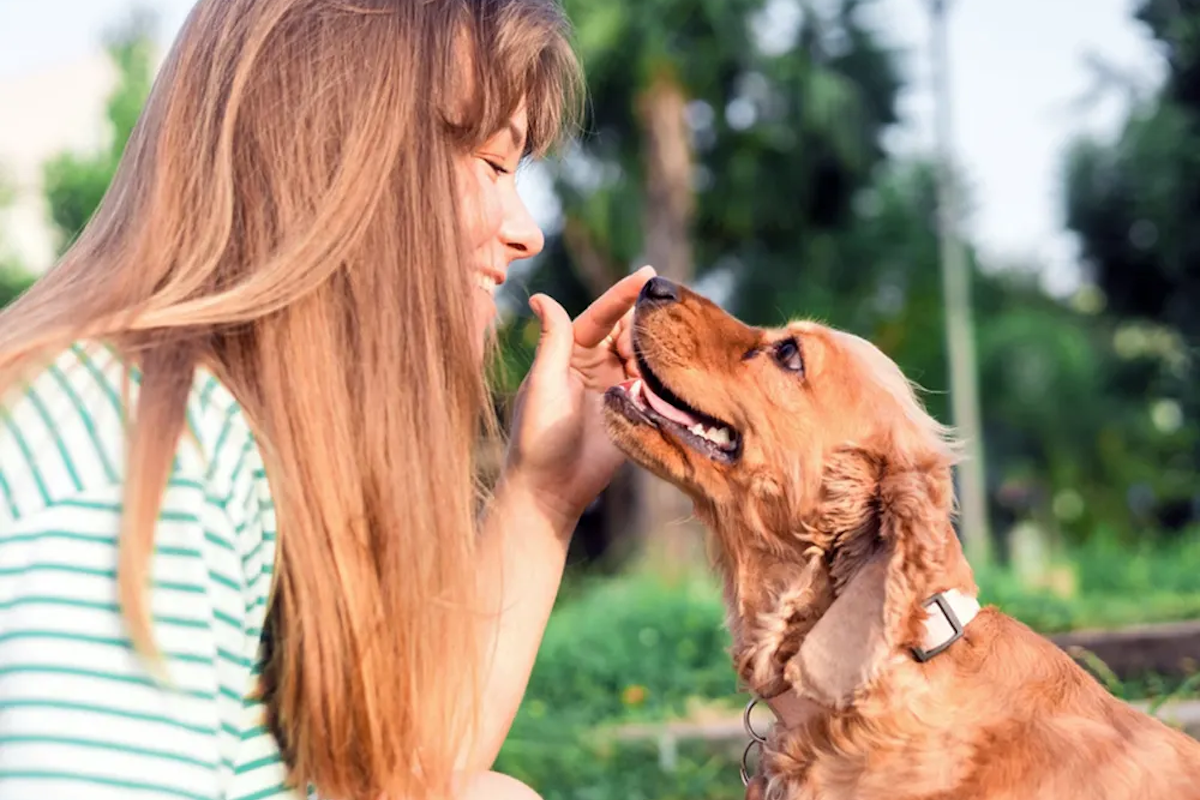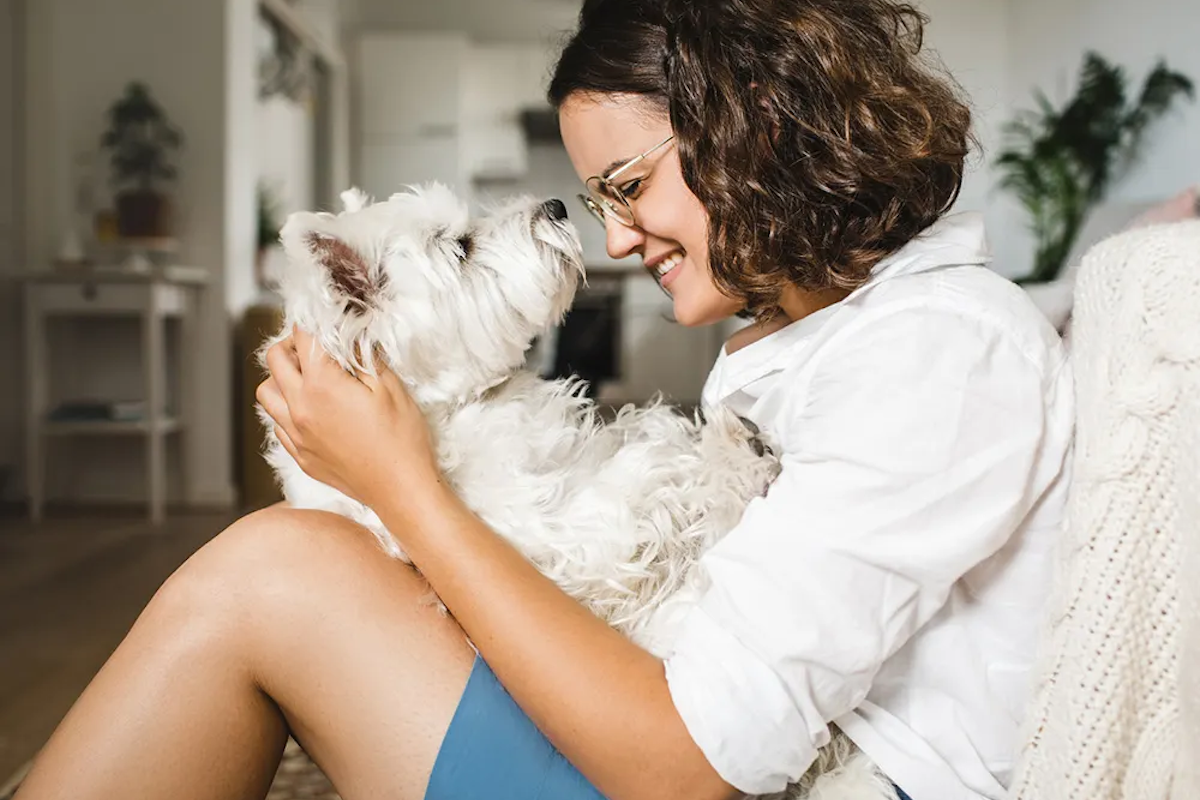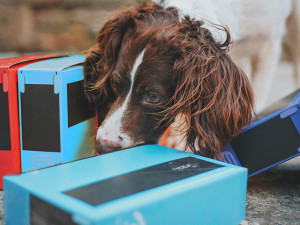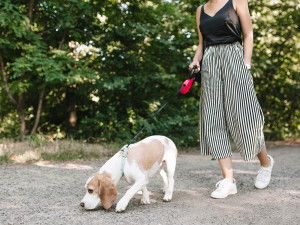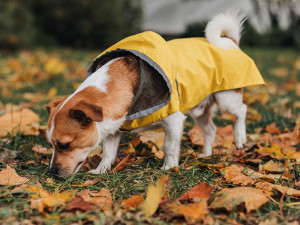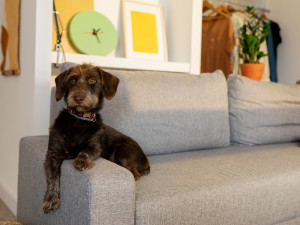Why Your Dog Is So Obsessed With Sniffing You When You First Get Home
They love a good smell sesh.
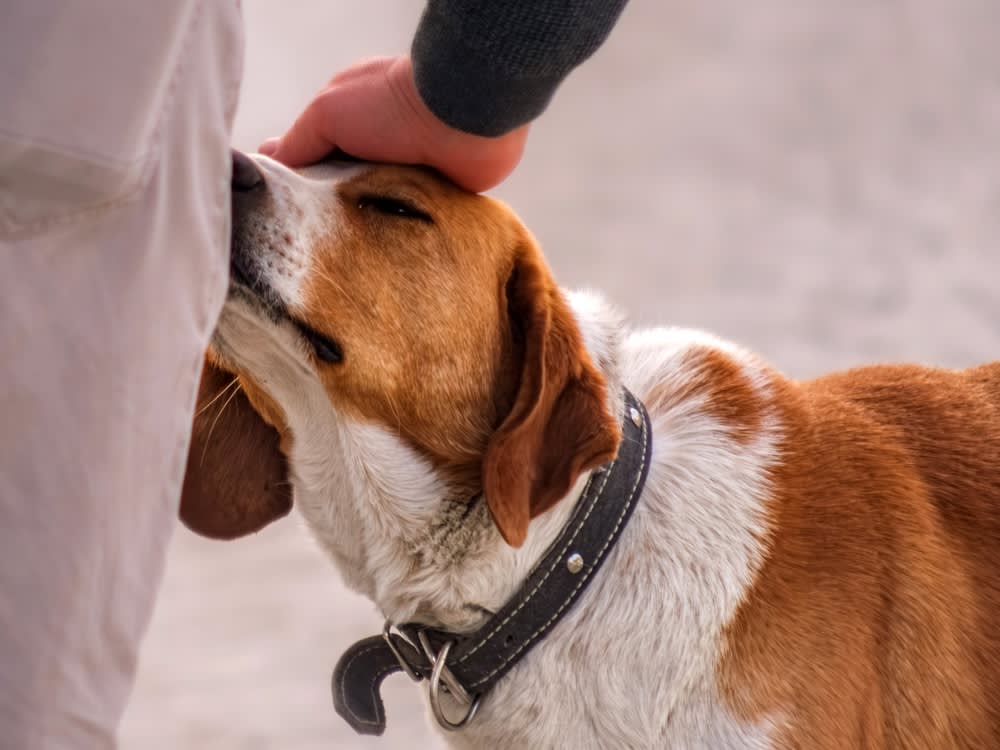
Share Article
When you get home from a hard day at work, one of the most rewarding things about having a dog is that they almost always greet you at the door. They want to sniff you, cuddle you, maybe jump up all over you… it probably makes you feel pretty loved. However, they might also be sniffing you a little bit too much. Even if you don’t really mind, you might be wondering why they’re so obsessed with running their curious little nose all over your body when you return to the house.
There are actually a few key reasons why your dog might be more interested in sniffing you when you first get in than any other time.
They are exploring the world through you.
Certified dog behaviorist who goes by Rachael Claireopens in new tab professionally, says that, first of all, it’s important to remember that dogs see the world through their noses.
In fact, it has been estimated that their sense of smell is from 1,000 to 100,000 times as good as ours. “Due to their incredible noses, they have the ability to separate out different scent particles or ‘odor molecules’ and identify them individually,” she says. “Odor molecules can be transferred in a number of ways, including when hitting an object after floating through the air, or through skin contact. Once the odor molecule has transferred to the surface, it can stay there until it is washed away.”
This means that, when you get in from work or the gym or wherever you’ve been all day long, you are like an “open book” for your dog, offering up “pages and pages of information about the outside world and what you have been up to without them,” Rachael Claire adds. “Your hair, clothing and skin are likely to be carrying odor particles that you have picked up, including any animals you have had contact with, food you have eaten, and even the air quality and weather. Think of your dog sniffing you intently as a way of reading the news and finding out what has been happening in the world while they have been home.”

They want to know where you’ve been — and make sure you’re OK.
Sian Lawley-Rudd is the founder of Lavender Garden Puppy and Dog Trainingopens in new tab, an award-winning ethical dog training business. She agrees with Rachael Claire and adds that when you get home, your dog is reading where you’ve been, who you’ve seen, and even what emotional state you’re in. Primarily, they’re gathering social information.
“If you’ve been around other animals or people, your dog can tell. They can detect the scent of other dogs, cats, or even the residual scent of someone else's perfume or deodorant,” Lawley-Rudd says. “If you’ve visited another household with pets or been in a setting like a puppy class, your dog will immediately recognize these unfamiliar scents and investigate.”
Additionally, dogs are incredibly sensitive to changes in human hormones, particularly the stress hormone cortisol and the bonding hormone oxytocin. “If you’ve had a stressful day or experienced a surge of excitement, your scent profile changes, and your dog may pick up on this shift.”
They just want to know they care.
Additionally, your dog might just be checking in, Lawley-Rudd says. “Just like checking your emails or social media feed on your phone, your dog uses scent to ‘check in’ with you. It’s a way of reconnecting and gaining familiarity. Some dogs might just give a few sniffs and move on, while others take their time, piecing together a scent story of your day.”
They need a sense of security.
For other dogs, smelling familiar things can be grounding for dogs, she adds: “It helps them to feel safe and secure. The process of sniffing in itself also helps lower arousal levels, reducing excitement and nervous energy.”
You might be wondering whether there’s such a thing as too much sniffing — is it always a good thing for your dog to be obsessed with sniffing you when you get home? Rachael Claire says that you should think of allowing a dog to sniff as giving a child a book. “It teaches them about the world and expands their knowledge,” she says. “Now imagine giving a child a book and continuously taking it away when they are in the middle of an interesting chapter. That would really frustrate them, right?”
She adds: “It would also stunt their learning and confidence levels. The same can be said for when your dog sniffs you when you return home. Allowing them a minute to finish the ‘book’ fulfills their inherent needs to explore the world through their noses.”
It helps them chill out.
Among other benefits, allowing your dog to smell you can release happy hormones into their system, helping to relieve stress and calm them down.
“In fact, the more you allow your dog to sniff each day, the calmer they will be by bedtime. Whenever your dog is sniffing, you make sure you allow them to finish in their own time to avoid building up any frustration in their system,” Rachael Claire says. “I know it isn’t normal for humans to go around sniffing each other, so we might find it a bit strange, but for dogs it is the most normal behavior in the world, so telling them to stop can be quite confusing or upsetting.”
However, if their behavior becomes obsessive or your dog is unable to break away after a period of time, or if they become distressed or aggressive upon smelling certain scents, you might become concerned. “If you feel that they are reacting negatively to the odor molecules you are carrying, you should redirect them onto some enrichment that is designed to calm them down,” Rachael Claire adds. “Slowly get up and walk away from your dog, or throw a toy to remove them from your proximity.
Avoid interacting with your dog, especially telling them off, to prevent any further arousal building. You can then leave the room and safely separate yourself from them, either behind a door or baby gate.” Then, prepare your dog some calming enrichment, such as a lick mat or snuffle mat, and give it to them behind the barrier.
Most of the time, though, you don’t need to worry if your dog is sniffing you; there’s no such thing as “too much” for them. Lawley-Rudd says you should think of it as a natural and necessary way for your dog to gain understanding. As long as it doesn’t become aggressive or excessive to the point of overstimulation, you don’t ever need to panic. In fact, Lawley-Rudd adds, you should take it as a compliment. They’re just excited to learn more about their favorite person!
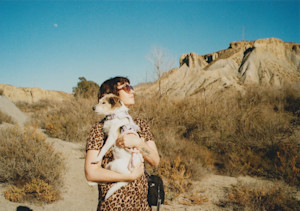
Marianne Eloise
Marianne Eloise’s work has appeared in The New York Times, The Guardian, The Cut, Vulture, and more. She is also the author of an essay collection Obsessive, Intrusive, Magical Thinkingopens in new tab. She has been going on adventures with her dog Bowie since she was 17.
Related articles
![Dog smelling boxes in nosework for dogs game]()
K9 Nose Work Let’s You See The World Through Your Dog’s Nose
The latest training activity develops your dog’s natural scenting abilities through fun and games.
![Woman in vintage striped pants walking in park while her pet is following the trail. Cute beagle dog sniffs something on the path in morning.]()
Does Your Dog Have a Nose For Scent Training?
This sounds like a competition show waiting to happen.
Do Dogs Really Hate Being “Booped”?
It might not be as harmless as it seems.
![Jack Russell Terrier in a yellow raincoat walks through the autumn park.]()
Dogs’ Sense of Smell: What Can Dogs Smell?
There’s a reason that sweet little nose is always pressed to the ground.
![Dark brown dog sitting on a gray couch in a living room]()
Turns Out Dogs Can Tell, Er, Smell Time
There’s no time like the present, according to your pet.
